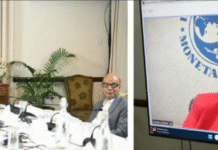‘We have already started reconstruction and reforms of Farmers Bank. The bailout will turn the bank into a semi-government bank as the five state-owned organizations will hold 60% of its shares’.
In a bid to save the scam-hit Farmers Bank Ltd from the liquidity crisis, the government and Bangladesh Bank have authorized four state-owned banks and one state-owned financial institution to inject Tk715 crore into the bank in exchange for 60% of its shares.
According to the circular, the four banks – Sonali, Agrani, Janata, and Rupali – will invest Tk165 crore each in the bank, while the state-owned Investment Corporation of Bangladesh (ICB) will provide Tk55 crore.
Meanwhile, Bangladesh Bank, the central bank, and apex regulatory body for the country’s monetary and financial system, issued a circular in this regard on Tuesday, relaxing three articles [14, 23, and 26] of the Bank Company Act 1991 to facilitate the bailout process.
According to article 14 of the act, no company is allowed to hold more than 10% of shares in a bank, while article 23 says a director of a bank shall not hold the same post at another bank at the same time. Under article 26, a company can hold a maximum 5% of shares of a bank’s paid-up capital, share premium, retained earnings, and statutory reserves combined.
But Bangladesh Bank has relaxed the three articles for the five institutions under article 121 that states the central bank can relax them in consultation with the government, when needed. The relaxation decision will take effect July 22, according to the circular.
On March 29, the government decided to inject the money into Farmers Bank, which has long been grappling with a number of financial anomalies. The bank has repeatedly failed to repay its depositors’ money on time.
Finance Minister AMA Muhith said on several occasions that they would not let the crisis-riddled bank fail, and would take measures to save it from dying out.
However, experts and economists have heavily slammed the government’s move.
‘Bailout will create a bad example’
On Wednesday, the Dhaka Tribune talked at length to economists and the bank’s higher-ups about whether the bailout could really save and revive the bank.
AB Mirza Azizul Islam, a former advisor to a caretaker government, said: “Injecting money into a scam-hit private bank will create a bad example in the banking sector. The banks, which will buy shares of Farmers Bank, are not in a good position either in terms of their financial performance and strength.
“These banks, too, need funds from the government to meet their capital requirements every year. The government has to keep a special allocation in the budget for recapitalization of state-owned banks.”
On the other hand, the ICB has good financial health, but injecting money into such a bad bank will be an unsafe investment, the economist observed.
Echoing him, former Bangladesh Bank governor Dr Salehuddin Ahmed said: “It’s a very unusual decision. As the four banks are themselves facing numerous challenges, questions arise as to how these institutions would protect and reconstruct Farmers Bank by buying shares and holding the positions of directorship on its board.
“The failure of a private bank may lead to a gross failure in the banking sector…The government made this decision based merely on political considerations.”
A mere bailout will not suffice to save Farmers Bank – its new directors must play a proactive role and execute their decisions properly, he added, stressing the need for removing those responsible for the crisis from the board and bringing them to book.
The board will have to concentrate on improving the bank’s management and efficiency, Dr Salehuddin said.
‘Bailout will expedite reform processes’
Terming the move an “accelerating” one, the bank authorities expressed hope that the bailout will expedite the ongoing reconstruction and reform processes.
“We have already started reconstruction and reforms of Farmers Bank. The bailout will turn the bank into a semi-government bank as the five state-owned organizations will hold 60% of its shares,” said Md Ehsan Khasru, managing director of the bank.
“As our rebranding process is going on, we are regaining the clients’ confidence. In recent times, we have undertaken a ‘reach and recover’ process to collect liquidity, and we have already collected Tk118 crore fresh deposits and Tk318 crore in outstanding loans.
“The bank has been receiving many rescheduling proposals,” Ehsan said. “Some of the clients who took loans from the bank are maintaining distance from it fearing that they would not get new credit even if they have money to repay their previous loans. And willful defaulters having surplus liquidity are waiting for the completion of reconstruction.”
Asked about the return of depositors’ money, Ehsan said: “The payment of corporations’ money might be delayed, but we are paying the individual depositors’ money now.”
He urged depositors not to be worried, saying the bank would be back on track soon.
Source: Dhaka Tribune










